1. Importance of Regular Camera Cleaning Near Me
Regular camera cleaning near me is an indispensable aspect of maintaining the performance, longevity, and value of your photographic equipment. Regardless of whether you are a professional photographer or an avid hobbyist, having your camera cleaned by a nearby expert can significantly impact the quality of your images and the health of your gear.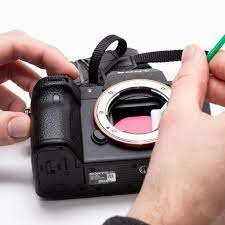
A. Protection Against Dust and Debris
Dust particles and other environmental contaminants can infiltrate your camera’s lens, mirror box, and most critically, its sensor. These particles can lead to spots, specks, or even blurry images. Regular local cleaning services ensure that these areas are meticulously cleared, preventing unwanted artifacts from appearing in your photos.
B. Prevention of Moisture Damage
Moisture, humidity, or accidental exposure to water can wreak havoc on electronic components and cause corrosion. Local camera cleaners often have facilities designed for dealing with such issues and can provide quick response times when immediate action is necessary to prevent long-term damage.
C. Preserving Optics Quality
The delicate coatings on camera lenses can be easily scratched if not cleaned properly. Professional cleaning near you uses specialized techniques and materials that won’t harm the lens coatings, thus preserving their clarity and ability to transmit light accurately.
D. Ensuring Smooth Operation
Fingerprints, grime, and dirt on moving parts like buttons, dials, and shutters can hinder smooth operation and lead to malfunctions over time. A regular cleaning regimen at a trusted local service keeps these parts functioning optimally.
E. Extending Equipment Lifespan
By keeping your camera clean and well-maintained, you’re less likely to experience premature wear and tear, which translates into longer-lasting equipment and potentially significant savings on repair costs.
F. Prompt Service and Convenience
Having access to camera cleaning services close to your location ensures convenience and faster turnaround times. This is particularly beneficial if you rely on your camera for work or upcoming events, as it minimizes downtime between shoots.
In summary, finding and utilizing a reliable camera cleaning service near you is a wise investment in the health and effectiveness of your photography equipment. It safeguards against potential problems, enhances image quality, and contributes to the overall satisfaction and success of your photography journey.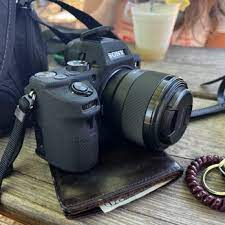
2. DIY Cleaning vs Professional Services
While some basic camera cleaning tasks can be done at home using specialized kits (like air blowers, lens pens, and microfiber cloths), certain components like the camera sensor require expert handling due to their delicate nature. For thorough and safe cleaning, consider local professional services that specialize in camera maintenance. They often have the right tools, expertise, and controlled environments to handle deep cleans without risking damage.
3. Finding Camera Cleaning Near Me Services
- Online Search:Start by searching “camera cleaning near me” on search engines to locate nearby stores and service centers. Many big-brand camera shops and independent repair stores offer this service.
- Retail Stores: Visit your local camera retailer or electronics store as they may provide in-store cleaning services or recommendations for trusted professionals.
- Photography Communities: Engage with local photography clubs or online forums to ask for recommendations. Fellow photographers are likely to share their experiences and point you towards reliable services.
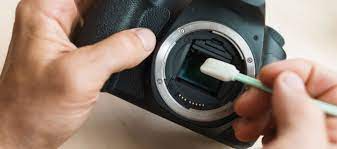
4. What to Expect During a Professional Camera Cleaning Near Me
A comprehensive camera cleaning typically includes:
- Sensor Cleaning: This process involves manually removing dust particles from the sensor using special tools and solvents under a microscope, ensuring no damage occurs.
- Lens Cleaning: The lens surface is meticulously wiped down to remove smudges, fingerprints, and other debris without scratching the coatings.
- Body Cleaning: The camera body, including buttons, dials, and viewfinder, is thoroughly cleaned to prevent corrosion and ensure smooth operation.
- Internal Checkup: Some services may include checks for any signs of wear and tear, lubrication of moving parts, and testing for any electronic issues.
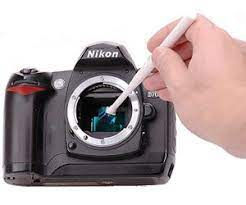
5. Factors to Consider When Choosing a Cleaning Service
When selecting a camera cleaning service, consider the following factors:
- Certification and Experience: Ensure the technicians are certified and have experience working with your specific camera brand and model.
- Reviews and Reputation: Look up reviews and testimonials from previous customers to gauge their satisfaction with the service provided.
- Cost and Turnaround Time: Compare prices among different providers and inquire about estimated turnaround times. While cost shouldn’t be the sole deciding factor, ensure it aligns with the level of service offered.
- Guarantees and Insurance: Choose a service that provides guarantees against accidental damage during the cleaning process and carries adequate insurance coverage.
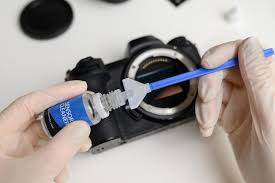
6. Preventative Maintenance Tips of Camera Cleaning Near Me
In addition to periodic professional cleanings, practice good preventative maintenance habits such as:
- Using Protective Gear: Always use a lens cap when the camera isn’t in use, and invest in a UV filter to protect the front element of your lenses.
- Cleaning Before and After Use: Gently wipe down your gear before and after each use, especially if shooting in dusty or humid conditions.
- Storage Conditions: Store your camera in a dry, cool place with silica gel packets to absorb moisture. Use a camera bag or case to protect from scratches and impacts.
7. Post-Cleaning Care and Follow-up
After you’ve had your camera professionally cleaned or performed a DIY cleaning, proper post-cleaning care and follow-up are essential to maintain its cleanliness and functionality. Here’s what you should consider:
A. Post-Cleaning Handling:
- Let it Dry: After any cleaning process, allow the camera and its components to dry completely before reassembling or using them. This is particularly important after sensor cleaning, where even slight moisture can cause damage.
- Handle with Care: Use clean, dry hands when handling your camera to avoid reintroducing dust or oil.
B. Regular Maintenance:
- Keep It Covered: Store your camera in a clean, dry camera bag or case when not in use. Use lens caps, body caps, and rear caps to protect lenses and sensors from dust and debris.
- Use Blower Brush and Cleaning Cloths Regularly: Carry a blower brush and microfiber cleaning cloths to remove surface dust between professional cleanings.
- Clean Lenses Before and After Use: Always clean your lenses before putting them away and before mounting them on your camera.
C. Monitoring and Follow-up Cleanings:
- Regular Check-Ups: Conduct regular inspections of your camera, especially the sensor if you shoot in dusty environments. If you notice spots or smudges that cannot be removed with a blower, it may be time for another professional cleaning.
- Professional Inspection Schedule: Depending on usage and environment, plan for professional check-ups every 6-12 months. Professional services often offer maintenance packages that include routine cleanings.
- Warranty and Service Records: Keep track of all service records as some manufacturers require proof of regular maintenance for warranty claims.
D. Preventative Measures:
- Avoid Changing Lenses in Dusty Areas: Try to change lenses in a clean environment to minimize dust entering the camera body.
- Use Air Conditioning Filters: When shooting indoors, use an air conditioning filter pointed towards the camera to catch airborne particles.
- Invest in a Sensor Cleaning Kit: For DSLR users, having a high-quality sensor cleaning kit at home can help address minor contamination quickly without risking damage.
E. Monitor Performance: Be vigilant about any changes in image quality, autofocus performance, or other issues that could indicate the need for further cleaning or service.
By following these steps, you’ll extend the life of your camera equipment and ensure optimal performance throughout its lifespan.